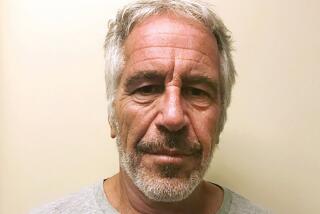Prison Scandal Could Sway High Court
The photographs of abused Iraqi prisoners have not only shaken the Bush administration, they also may have fatally undercut its defense in the Supreme Court of its handling of suspected terrorists, some legal experts said Monday.
“Their argument has been ‘Trust us,’ and that argument has been deeply undermined,” said Yale University professor Harold Koh, an international law expert who served in the Clinton administration. “To accept the government’s argument in the face of what has been disclosed would be to condone a culture of indifference.”
Koh was referring to the administration’s contention before the high court last month that the president and his military commanders had the exclusive power to decide the fate of those captured in the war on terrorism. This is so whether the detained men are foreigner fighters held at the U.S. naval base at Guantanamo Bay, Cuba, or Americans who are arrested in this country, the government’s lawyers said.
Shortly after U.S. troops invaded Afghanistan in late 2001, the administration declared that the prisoners captured there and held at Guantanamo Bay were not entitled to the protections of the Geneva Convention. These men were deemed to be “unlawful enemy combatants” who were outside the protections of international law or U.S. civil law.
International law experts sharply criticized this decision to create what they called a “law-free zone.” When appeals were filed on behalf of 16 detainees, seeking a hearing before a judge, the Supreme Court surprised the administration by voting to take up the issue. Nonetheless, administration lawyers went before the high court in April to argue that because it was wartime, the federal courts had no power to even hear claims from the imprisoned men.
The third of three such cases, Rumsfeld vs. Padilla, was heard April 28, and several justices asked whether there was a legal “check” on abusing prisoners in order to get information.
“Suppose the executive [branch] says mild torture will help get this information?” asked Justice Ruth Bader Ginsburg.
Deputy Solicitor Gen. Paul Clement replied that committing “an atrocity” against a prisoner was a crime and could result in the court-martial of a military officer. But when pressed, he added that “our executive doesn’t” do that sort of thing. “You have to recognize that in situations where there is a war ... you have to trust the executive,” he said.
That evening, CBS broadcast the first photos of American soldiers mistreating Iraqi men held at the Abu Ghraib prison near Baghdad.
Two days later, the justices met to cast their tentative votes and begin working on opinions in the cases.
“In a close and difficult case like this, this could tip the scales,” said Michael J. Glennon, an international law expert at Tufts University. “The overriding issue in these cases has been to what extent can you trust the executive to police itself. They say you should trust us to do the right thing, but the evidence now suggests they cannot be trusted. It requires legislative and judicial oversight.”
Deborah Pearlstein, a former court clerk who is now a lawyer for Human Rights First, agreed that the prison abuse scandal might tip the outcome at the Supreme Court. “Yes, I think this might affect Justices [Sandra Day] O’Connor and [Anthony M.] Kennedy,” she said, referring to the two moderates who often cast the deciding votes.
“The court specifically asked during the argument, ‘How do we know the prisoners are not being tortured?’ The Pentagon had this report in January. I think they will be displeased to learn about this the way it came out,” Pearlstein said.
But a former Bush administration lawyer who advised the White House on wartime issues disagreed and said the Iraqi scandal should have no effect on the court’s decision on prisoners held at Guantanamo Bay.
“It is a false analogy. These are two separate and different kinds of detainees,” said John C. Yoo, a former court clerk who is now a law professor at UC Berkeley. “Iraq detainees are covered by the Geneva Convention. And the Geneva Convention prohibits physical abuse of prisoners. Sometimes prison guards break the law, and they should be tried and punished,” he said.
Yoo also said it was too early to conclude that the military’s system had failed. “The military has a built-in system for handling problems like this, and they detected these violations and were acting on them,” he said. “The Supreme Court doesn’t have to micromanage every aspect of the government, especially in wartime. If so, there could be thousands of people [in Iraqi prisons] filing appeals in the federal courts. I have a hard time seeing how the Supreme Court would want to take up all these cases.”
A Washington lawyer who represented some of the Guantanamo Bay detainees blamed the Iraqi prison scandal in part on the administration’s refusal to accept legal checks on its authority.
“This started with Guantanamo. They chose that site purposely to be beyond the law. They created an atmosphere of illegality, that anything goes when you are interrogating. And we are seeing in the torture scandal the unfortunate consequences of that attitude,” said Thomas B. Wilner, who appealed on behalf of Kuwaiti men held at Guantanamo.
He and other lawyers say they have no idea whether their clients have been abused because they have not been permitted to see them or inspect the prison.
More to Read
Start your day right
Sign up for Essential California for news, features and recommendations from the L.A. Times and beyond in your inbox six days a week.
You may occasionally receive promotional content from the Los Angeles Times.







